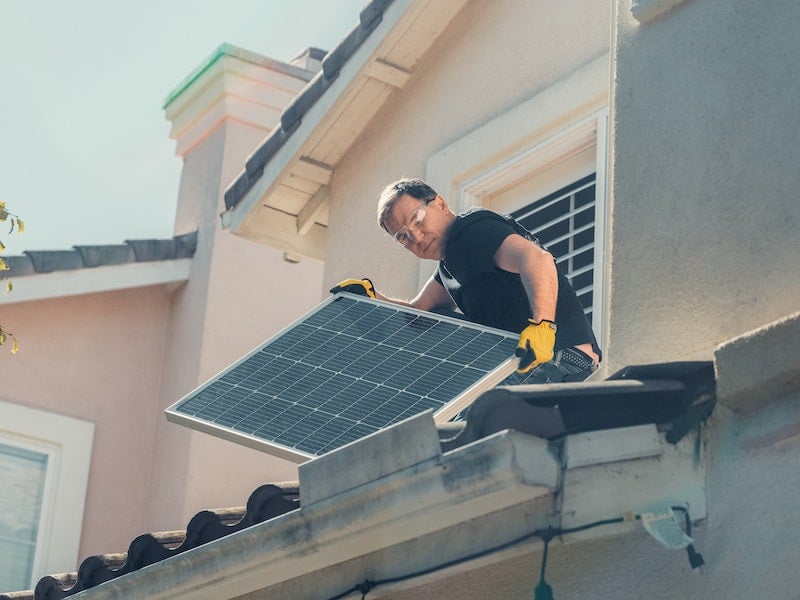
Federal Solar Tax Credit and Incentives
Everything you need to know about the federal solar tax credit.
Is solar right for you?
Find out in less than a minute.
Disclaimer: This article provides an overview of the federal investment tax credit for residential solar photovoltaics (PV). It does not constitute professional tax advice or other professional financial guidance. At EnergyBot we strive to provide you the best available information; however, we are not tax professionals.
The federal solar tax credit is available to homeowners who purchase a new solar system.
The Inflation Reduction Act increases the available tax credit to 30%, starting January 1, 2023. This means it is possible to get up to 30% of the cost of solar to reduce your federal taxes owed.
Tax Credit is NOT a Tax Rebate
A tax credit is not a tax rebate. If you owe taxes at the end of the year, this amount will be reduced from the amount you owe. If you are expecting a tax refund, then this money will not be added to your tax refund.
Also known as an Investment Tax Credit (ITC). However, this is different from an ITC that may be offered to businesses that own solar panels.
What items can you apply the tax credits to?
Just buying the solar panels is half the battle. Luckily the tax credit also applies towards the labor to install the solar panels and other equipment.
- The solar panels themselves
- Contractor labor to install the solar power system
- Wiring, inverters, and mounting equipment
- Sales taxes on eligible expenses
Are solar batteries eligible for the Federal Solar Tax Credit?
Yes, solar batteries are eligible for the federal solar tax credit. And they don't have to be purchased together!
- The batteries themselves
- Contractor labor to install the energy storage system
- Wiring, inverters, and mounting equipment
- Sales taxes on eligible expenses
Looking to include an energy storage system (a.k.a. batteries) to your system as well? They are included! They also don't need to be installed at the same time as your solar panels. If you have a PV system already and are looking to add batteries, you can get the 30% tax credit towards just the batteries and installation of those on your next federal income taxes.
What Solar Systems are Eligible for the Federal Solar Tax Credit?
The brand of your solar panels does not affect your ability to claim the solar tax credit. Nor does other things like the type of inverter you use.
How much does 30% equate to?
To know that, we need to know how much solar panels cost. The EnergyBot team put together a solar cost guide just for our readers. An average 10 kilowatt (kW) residential solar panel system costs around $30,000 - $35,000.
For most homeowners that means a $4,000 to $6,000 tax credit for going solar. The actual credit will depend on a few factors like the size of your system, and labors costs in your area.
The cost could be more if you decide to add energy storage batteries.
Luckily, there is no maximum dollar limit to the tax credit you can receive.
How do I calculate how much tax credit I will receive?
In practice the solar tax credit would look like this:

Who is eligible for the federal solar tax credit?
Any US taxpayer who purchases a new solar system installation is eligible for the federal solar tax credit.
The keyword is “purchase”. Solar leases, and solar PPAs are not eligible for the tax credit.
So if you pay upfront or finance your solar panel system and file federal income tax you can receive this tax credit.
Your new renewable energy system must be installed and working to receive the tax credit. If you have only purchased the equipment but have not installed the system, you are not eligible.
How to claim the federal solar tax credit
To claim the federal solar tax credit you must submit Form 5695 to the IRS. It is a relatively simple two-page form that looks similar to a W2 or 1099. After completing the form you will include it when your income taxes.
Federal Solar Tax Credit forms:
If you’re thinking about investing in solar it’s important you claim the solar tax credit sooner rather than later. Over the next few years, the benefits of the credit will continue to diminish.
Federal Solar Tax Credit Timeline
The federal solar tax credit has a series of changes that continue to dissipate over time. The idea is that as solar panels continue to get cheaper and more efficient the tax credit would not be necessary.

2017 – 2019 ITC Changes
Tax credit refunds 30% of the cost of the system for residential.
2020-2021 ITC Changes
Residential receive a 26% deduction of the cost of the system from their taxes.
2022 to 2032 ITC Changes
Residential receives a 30% deduction of the cost of the system from their taxes.
2033 ITC Changes
Residential will be reduced to 26% deduction of the cost of the system from their taxes.
2034 ITC Changes
Residential will be reduced to 22% deduction of the cost of the system from their taxes.
2035 ITC Changes
The federal solar tax credit expires.
Local Solar Tax Credits and Incentives
Depending on where you live you may be able to receive various tax credits, rebates, and other incentives from your local government and or utility. The rebates can have a drastic impact on the cost of your solar system so make sure you research all the available options. The DSIRE database built by the NC Clean Energy Technology Center is a great resource to find local incentives.
Written by Thad Warren
Thad is a native Texan who has worked in the energy industry for just over 5 years.
Connect
Recent Posts
Compare Texas Solar Buyback Plans
Discover the best Texas solar energy buy back programs for 2025! Compare rates, terms, and providers to maximize savings and make the most of your solar investment.
September 2025

7 minutes

How Efficient Are Solar Panels
How efficient are solar panels compared to other types of energy generation?
March 2023

4 minutes

What You Need To Know About The California Solar Mandate
Learn how the California Solar Mandate changes how new homes are built.
July 2023

4 minutes



